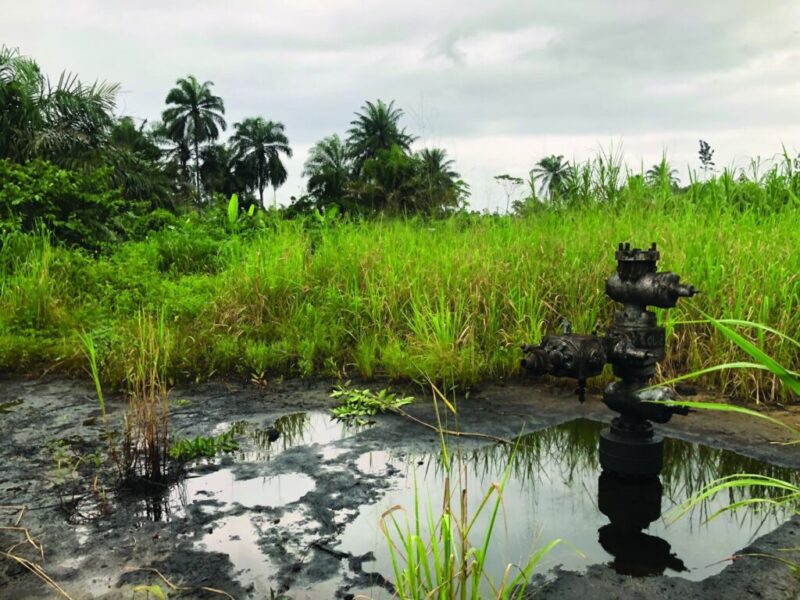National Issues
The Nigeria Oil “Thieves” are not Hidden: A Peep At History -By Caleb Onah
The vast expanse of the Niger Delta region, where most oil theft activities occur, presents a logistical challenge for law enforcement agencies. Additionally, corruption within the system, inadequate legal frameworks, and porous borders contribute to the persistence of oil theft which needs urgent attentions.

An article published in an American magazine in January 2023 describes the story of three women from Otuabagi and how the Niger Delta’s problems stemmed from a simple but serious misunderstanding. In 1956, a few years before Nigeria’s independence, European engineers arrived in town with goals that were not clear to the locals.
They started digging holes around the creek in the area. The Engineers eventually found what they were looking for and returned with heavy equipment, unnamed, but declared their intention to camp in the area. At the table, the eldest of the three women, then a little girl, said, “Our people are not very educated.
When these white people arrived, we didn’t quite understand their language.” When Europeans asked the name of a town along this oil-rich stream, the locals misunderstood their question. They believed the technicians were asking about the area the village belonged to. This confusion was caused by the fact that whites showed little interest in names given by natives. Instead, they superimposed their own names and administrative concepts, such as parishes, counties, and what we call “Nigeria” today, over the geography of the region.
As a result, the villagers responded by saying they were part of the Oloibiri region. As a result, the first oil well in Nigeria was named “Oloibiri Well 1.” Even today, we are taught that oil, the valuable resource that typically contributes to half of the federal budget and accounts for approximately 90% of the country’s foreign exchange earnings, was initially discovered near Oloibiri town in present-day Bayelsa State in 1956, home of Nigerians previous president, Dr. Goodluck Ebele Jonathan. However, the people of Otuabagi maintain that they have never fully recovered from this initial misunderstanding. “The name is one of the problems in our community. It has continued to affect us till this day,” asserts the another woman from Otuabagi to a journalist.
This can be said to be the “genesis” of Nigerians oil challenges and where oil theft by locals and individuals began to roar. Oil theft, also known as “bunkering,” involves the illegal extraction, refining, and sale of crude oil and its products. It has become a pervasive problem in Nigeria, causing immense financial losses, environmental degradation, and funding criminal activities. Estimates suggest that Nigeria loses billions of dollars annually due to oil theft, making it a matter of utmost concern for the government and international stakeholders.
The perpetrators of oil theft in Nigeria are often organised criminal syndicates, who employ sophisticated methods to carry out their illicit activities. These include hacking into pipelines, bribing security personnel, and setting up illegal refineries in remote areas. The stolen oil is sold on the black market and eventually enters international markets through various channels, including local smuggling networks.
Besides the economic impact, oil theft is taking a toll on Nigeria’s environment. Illegal oil theft activities, such as broken pipelines and illegal refining, lead to oil spills, deforestation, and air and water pollution. These environmental impacts have serious impacts on the health and livelihoods of the communities living in the affected areas.
Unveiling the Hidden Thieves
During a policy dialogue on the utilisation of beneficial ownership data in Nigeria`s crude swap deals, the executive secretary of the Nigerian Extractive Industries Transparency Initiative (NEITI), Orji Ogbonnaya, revealed that between 2009 and 2020; Nigeria suffered a significant loss of 619.7 million barrels of crude oil. This loss, amounting to a value of N16.25 trillion ($46.16 billion), was attributed to crude oil theft.
The disclosure underscores the urgent need to combat corruption in the country’s oil sector and address the issue of stolen crude oil. The dialogue took place in Abuja. According to Orji Ogbonnaya, the executive secretary of NEITI, the volume of crude oil stolen from Nigeria amounted to a staggering loss of more than 140 thousand barrels per day. Additionally, between 2009 and 2018, the country experienced a loss of 4.2 billion litres of petroleum products from refineries, which had an estimated value of $1.84 billion.
These findings were derived from NEITI`s latest policy brief titled “The cost of fuel subsidy: A case for policy review.” The brief also revealed that Nigeria’s expenditure on fuel subsidies between 2005 and 2021 exceeded N13 trillion ($74 billion).
Ogbonnaya emphasised the significant impact of these subsidy costs, stating that they equated to the entirety of Nigeria’s budget for crucial sectors such as health, education, agriculture, and defense over the past five years. Furthermore, the subsidies almost matched the country’s capital expenditure for a period of ten years, spanning from 2011 to 2020.
The executive secretary highlighted several adverse consequences resulting from the high fuel subsidy costs, including the discouragement of private sector investments in the downstream and midstream petroleum sectors, exacerbation of Nigeria’s debt profile, and the creation of inefficient supply arrangements leading to scarcity.
While this is recent, in 1966, a group of young individuals from the Ijaw ethnic group, led by a soldier named Isaac Boro, initiated an armed protest against the exploitation of the Niger Delta’s oil by a distant federal government and international companies. Their aim was to establish a “Niger Delta Republic.”
They engaged in a 12-day conflict with government forces before being defeated, but their resistance and sacrifice left a profound impact on the delta that endures to this day. During the brutal civil war in Nigeria from 1967 to 1970, both the federal government and the breakaway Republic of Biafra sought to control the Niger Delta in the initial months of the conflict, putting the region’s inhabitants in a precarious position.
The government as usual eventually gained control of the oil fields and emerged victorious. In the following years, Nigeria experienced a surge in prosperity due to the Arab oil embargo and the subsequent increase in the price of Brent crude. This led to significant government spending and infrastructural development. However, the benefits of this prosperity were not evenly distributed or sustainable, as corrupt military regimes misappropriated a substantial portion of oil revenue or directed it towards extravagant projects that now lie in disrepair.
Over these years, most communities in the Niger Delta did not witness any significant improvements in their living conditions; instead, they endured environmental disasters. Delta communities allege that international oil companies (IOCs) frequently neglected maintenance of their equipment, causing corrosion and oil leakage into the waterways after decades of use. Authority Benson, an environmental scientist at Niger Delta University, describes the cumulative impact of these spills as ecocide, stating, “It’s killing everything. Water becomes dead water. The forest is dead, if it’s a river; it’s a dead river because there’s no nutrient cycle.”
Despite the environmental damage caused by oil production in the Niger Delta, some people have benefited from the situation. This included activists chosen by the International Oil Company (IOC) or the military regime, as well as well-connected individuals in the region who discovered that covertly damaging oil pipelines could yield lucrative contracts for subsequent cleanup.
This period highlighted the realization that everything became a business, as Bayelsa colleagues explained. After the execution of nine environmental activists by General Sani Abacha’s military regime in 1995, global attention to environmental degradation in the Niger Delta increased.
This has led to international sanctions and condemnation at the United Nations. However, the Nigerian government was unaffected by these measures and preferred oil revenues to the country’s international reputation. Aggressive tactics were used to ensure a continuous supply of oil. Even after Nigeria’s transition from a military junta to democracy in 1999, newly elected President Olusegun Obasanjo characterised the “crisis in the oil fields” as a major emergency for the country in his inaugural address.
Subsequently, thousands of troops were deployed to the area to quell the growing unrest and unrest. Oil thieves may appear to operate in the shadows, but their activities are not completely hidden. The spread of social media and citizen journalism has revealed the extent of oil theft in Nigeria. Videos and images depicting illegal recycling operations, pipeline vandalism and even security guard adhesions surfaced online, revealing the extent of the problem.
Also, the economic consequences of oil theft cannot be ignored. In addition, as stolen oil flows into the black market, it affects international oil prices, drawing attention from international actors such as regulators and reporters. By highlighting the monetary impact and revealing the market dynamics of stolen Nigerian oil, these actors are helping to raise awareness of oil theft and related criminal networks.
Government Efforts and Countermeasures
Over the years, the Nigerian government acknowledges the gravity of the oil theft problem and has taken several steps to address it. The establishment of the Nigerian Maritime Administration and Safety Agency (NIMASA) and the Nigerian Navy’s formation of the “Operation Tsare Teku” initiative are examples of the government’s commitment to combating oil theft.
Further, given the global implications of oil theft in Nigeria, international collaboration is crucial in curbing this illicit trade. Nigeria has sought assistance from various international partners, including the United States and neighbouring countries, to tackle the issue. Collaborative efforts involve sharing intelligence, providing technical expertise, and improving maritime security to intercept and apprehend oil thieves. Despite the combined efforts of the Nigerian government and international partners, several challenges impede the eradication of oil theft in Nigeria.
The vast expanse of the Niger Delta region, where most oil theft activities occur, presents a logistical challenge for law enforcement agencies. Additionally, corruption within the system, inadequate legal frameworks, and porous borders contribute to the persistence of oil theft which needs urgent attentions.




















